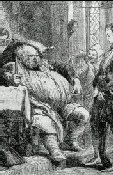SKIN DISEASES IN SHAKESPEARE'S WORKS
J. GOENS - P. GHEERAERT
Brussels - Belgium
It can be astonishing to notice the extreme richness of Shakespeare's works in medical allusions of all kinds. However the medical knowledges of his time were less technical, more descriptive than today and thus more accessible to a non medical intellectual. Moreover Shakespeare himself, besides his own qualities that made him receptive to a large range of knowledges, has perhaps benefited from the medical influence of his son-in law, Doctor John Hall.
William Shakespeare
 In the field of dermatology, if it is previsible to find in Shakespeare's works allusions to the great epidemical diseases like pox, plague or even leprosy, it is more surprising to see his interest to common dermatosis, of which he was an attentive observer. But he also uses these diseases in a way very astonishing for the average reader. For a better comprehension, one has to replace Shakespeare's works in the general context of elizabethan playwright. Optimism was there mostly in the foreground, diseases were considered with philosophy as a risk inherent in life itself, like war wounds or hangovers, but especially language was very peculiar : surprisingly crude, even from inferior to superior, full of puns but also of curses, contempts and conjuratory expression.
In the field of dermatology, if it is previsible to find in Shakespeare's works allusions to the great epidemical diseases like pox, plague or even leprosy, it is more surprising to see his interest to common dermatosis, of which he was an attentive observer. But he also uses these diseases in a way very astonishing for the average reader. For a better comprehension, one has to replace Shakespeare's works in the general context of elizabethan playwright. Optimism was there mostly in the foreground, diseases were considered with philosophy as a risk inherent in life itself, like war wounds or hangovers, but especially language was very peculiar : surprisingly crude, even from inferior to superior, full of puns but also of curses, contempts and conjuratory expression.
Shakespeare frequently choosed dermatologic terms to this use ; let's mention words like measles, scurvy, tetter, serpigo, hoar, scab, lousy, plague, pestilence, leprosy, mole, wart, itch, boil, blister, blain, sore, ulcer, pox, carbuncle ...
These diseases were semantically associated to the worse malediction, in the context of a very superstitious langage ; the characters hoped so to conjure or provoke bad fortune.
To illustrate this one can mention several categories of examples :
- The plain swear-word : " Scurvy knave ! " (Romeo and Juliet).
- The direct insult : " Thou art a boil, a plague sore, an unbossed carbuncle (King Lear).
- The indirect insult : " The rascally, scald, beggarly, lowsy pragging knave pistol " (Henri V).
- The curse on a person : " All the contagions of the south lie on thou " (Coriolan).
- " I would make thou the loathsomest scab in Greece " (Troïlus and Cressida).
- The curse on an object or a concept : " The dry serpigo on the subject " (Troïlus and Cressida ).
- " A pox on/of : Your love letter, this joke, your throath, the devil, your bottle, the wrinkles, this gut, her green-sickness ... ".
- Offensive imprecation : " Plague all ... be general leprosy " (Timon of Athenes).
- Defensive imprecation : " If I prove honey mouthed let my tongue blister " - this example, taken from " A winter's tale " is of course an allusion to herpès. Finally, conjuration can be illustrated by the end of " A midsummer's night dream ", when Oberon wishes to the young-married " Never mole, hare-lip nor scar, shall upon their children be ".
As, at this time, birthmarks were considered as signs of bad Omen and even, in certain cases, as a diabolic or witchy manifestation. This allows to introduce the problem of Shakespeare's consideration of congenital malformations. He evokes, in " King John ", the persistence of the belief that considers birthmarks as nature's errors indicating caracter's errors " : " If thou wert grim, ugly and slandrous to thy mother's womb, full of unpleasing blots and sightless stains, lame, foolish, crooked, swart, prodigious, patched with foul moles and eye-offending marks, then I should not love thee, nor thou become thy great birth, nor deserve a crown ".
But Shakespeare doesn't seem to approve this belief, as indicated in " Hamlet " : " So, oft it chances in particular men, that for some vicious mole of nature in them, as in their birth - wherein they are not guilty, since nature cannot choose his origin - their virtues else, be they as pure as grace, as infinite as man may undergo, shall in the general censure take corruption from that particular fault ".
However Shakespeare describes Richard III as a physical monster and clearly associates it to moral monstruosity, as said by Richard himself in the text : " Then, since the heavens have shaped my body so, let hell make crooked my mind to answer it ".
Richard III
 Shakespeare is thus in this case in total contradiction with a humanitarian vision of congenital malformation that he has several times expressed, as for example in " The rape of Lucrece ". " For marks described in men's nativity are nature faults, not their own infamy " or in " The twelfth night " : " In nature there's no blemish but the mind ; none can be called deformed but the unkind ".
Shakespeare is thus in this case in total contradiction with a humanitarian vision of congenital malformation that he has several times expressed, as for example in " The rape of Lucrece ". " For marks described in men's nativity are nature faults, not their own infamy " or in " The twelfth night " : " In nature there's no blemish but the mind ; none can be called deformed but the unkind ".
This flagrant contradiction by a writer as clear-sighted as Shakespeare suggests that he has written Richard III under influence. This influence was a tudorian one as Shakespeare wrote during the reign of Elizabeth Tudor and took his inspiration from historians working under service and for the legitimation of the tudorian sovereigns like Thomas More or Raphaël Holinshed. However modern historians like Paul Murray Kendall tend to show that Richard III, last heir of the legitimate York royal family, was neither a physical nor a moral monster and was described so by the tudorians to justify their illegal presence on the english throne.
If Richard III is probably one of Shakespeare's most sinister characters, John Falstaff is certainly one of the funniest and one of the most important comical creations of the whole world litterature.
To end this text with an humoristic citation, the right choice is probably Falstaff's description of his friend Bardolph's nose afflicted by rhinophyma, almost as famous as Cyrano de Bergerac's nose.
In a tavern, Bardolph dares to make a remark about Falstaff's fatness and the associated way of life.
J. Falstaff
 Falstaff's answer comes immediately :
Falstaff's answer comes immediately :
" Do thou amend thy face, and I'll amend my life : thou art our admiral, thou bearest the lanthorn in the poop, but 'tis in the nose of thee : thou art the Knight of the Burning Lamp (...).
I never see thy face but I think upon hell-fire and Dives that lived in purple ; for there he is in his robes, burning, burning. If thou wert any way given to virtue, I would swear by thy face ; my oath should be, 'By this fire, that's God's angel : ' but thou art altogether given over, and wert indeed, but for the light in thy face, the son of utter darkness. When thou rannest up Gadshill in the night to catch my horse, if I did not think thou hadst been an ignis fatuus or a ball of wildfire, there's no purchase in money. O ! thou art a perpetual triumph, an everlasting bonfire-light. Thou hast saved me a thousand marks in links and torches, walking with thee in the night betwixt tavern and tavern : but the sack that thou hast drunk me would have bought me lights as good cheap at the dearest chandler's in Europe. I have maintained that salamander of yours with fire any time this two-and-thirty years ; God reward me for it ! ".
Finally, the importance of venereal diseases in Shakespeare works and Elizabethan litterature is also outstanding, especially in double-entendre language. But this subject is so broad that it would deserve a book-length text and so the reader is kindly left here in the company of John Falstaff saying to Bardolph : " A pox of this joke ! ".
Back to the texts' index
Back to the main page
 In the field of dermatology, if it is previsible to find in Shakespeare's works allusions to the great epidemical diseases like pox, plague or even leprosy, it is more surprising to see his interest to common dermatosis, of which he was an attentive observer. But he also uses these diseases in a way very astonishing for the average reader. For a better comprehension, one has to replace Shakespeare's works in the general context of elizabethan playwright. Optimism was there mostly in the foreground, diseases were considered with philosophy as a risk inherent in life itself, like war wounds or hangovers, but especially language was very peculiar : surprisingly crude, even from inferior to superior, full of puns but also of curses, contempts and conjuratory expression.
In the field of dermatology, if it is previsible to find in Shakespeare's works allusions to the great epidemical diseases like pox, plague or even leprosy, it is more surprising to see his interest to common dermatosis, of which he was an attentive observer. But he also uses these diseases in a way very astonishing for the average reader. For a better comprehension, one has to replace Shakespeare's works in the general context of elizabethan playwright. Optimism was there mostly in the foreground, diseases were considered with philosophy as a risk inherent in life itself, like war wounds or hangovers, but especially language was very peculiar : surprisingly crude, even from inferior to superior, full of puns but also of curses, contempts and conjuratory expression. Shakespeare is thus in this case in total contradiction with a humanitarian vision of congenital malformation that he has several times expressed, as for example in " The rape of Lucrece ". " For marks described in men's nativity are nature faults, not their own infamy " or in " The twelfth night " : " In nature there's no blemish but the mind ; none can be called deformed but the unkind ".
Shakespeare is thus in this case in total contradiction with a humanitarian vision of congenital malformation that he has several times expressed, as for example in " The rape of Lucrece ". " For marks described in men's nativity are nature faults, not their own infamy " or in " The twelfth night " : " In nature there's no blemish but the mind ; none can be called deformed but the unkind ". Falstaff's answer comes immediately :
Falstaff's answer comes immediately :